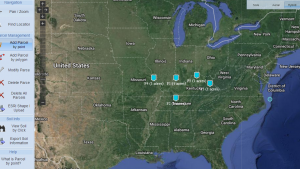Stressors and impacts
As society recognizes the global problem of carbon pollution, consumer demand for “green” products and services is growing and companies are looking for ways to reduce their carbon footprints. These trends are evident in corporate efforts to restructure supply chains, global food companies’ participation in initiatives to promote sustainable agricultural practices, and companies providing support for healthy soils initiatives that can increase carbon storage.
Accounting for carbon
Though agriculture accounts for less than 10 percent of U.S. greenhouse gas emissions, the sector has unique opportunities to provide carbon sequestration and emission reduction solutions. For instance, growing plants to remove carbon from the atmosphere, and storing that carbon in soils as beneficial organic matter, provides atmospheric benefits; it also provides the co-benefit of increasing the water-holding capacity, health, and resilience of the soils.
Another way land managers can reduce their environmental impact—and tap into a potential source of new revenue—is by participating in emerging carbon markets. To participate in these voluntary markets, farmers, ranchers, and forest landowners need a way to document changes in their operations’ greenhouse gas emissions and carbon storage abilities. COMET-FARM—a carbon accounting system for farms and ranches—is an online tool that meets these needs.
COMET-Farm helps farmers and ranchers compile a detailed inventory of emissions and carbon storage on their properties. Drawing on existing soil and climate data and greenhouse gas quantification methods, the website generates tailor-made reports for each property in a secure online environment. Once users complete a baseline inventory, they can use the tool to quantify how alternative management strategies could impact their emissions and capacity to store carbon. To obtain precise estimates, ranchers overlay alternate strategies on satellite images of their properties, and COMET-FARM calculates their potential for reducing emissions and increasing carbon sequestration.
The Marin Carbon Project
COMET-Farm is being used as part of a pilot project in Marin County, just north of San Francisco, California. The Marin Carbon Project works with agricultural land managers, under funding through the Department of Agriculture’s Natural Resources Conservation Service's (NRCS) Conservation Innovation Grants Program, to find cost-effective ways to increase on-farm carbon sequestration in soils and vegetation. Starting with three demonstration properties, project personnel performed extensive baseline soil sampling and rangeland assessments, and then applied nearly 4,000 cubic yards of compost across almost 100 acres of rangelands on the properties. Next, project personnel work with the landowners to select management practices that build soil carbon and improve productivity, biodiversity, and agroecosystem resilience. Each property develops a comprehensive Carbon Farm Action Plan to document the net change in emissions and carbon capture and sequestration resulting from the new practices. All greenhouse gas reductions for each farm will be quantified, based on tons of carbon sequestered or avoided, using the COMET-Farm framework.
Improving the tool and moving forward
COMET-Farm is developed by the NRCS in collaboration with Colorado State University. This innovative tool is currently being updated to reflect cutting-edge science in greenhouse gas quantification: it will incorporate information from the recently released USDA report Quantifying Greenhouse Gas Fluxes in Agriculture and Forestry: Methods for Entity-Scale Inventory. Additionally, the Marin Carbon Project is collaborating with developers of COMET-Farm to collect data on farming practices that are not currently coded into the tool; these practices will be added as new management options to improve the tool’s flexibility and usefulness.
Partners in the Marin Carbon Project feel hopeful that within two years, a sufficient number of properties in Marin County will be implementing Carbon Farm Action Plans so they can aggregate the greenhouse gas benefits and take them to the voluntary carbon offset markets. COMET-Farm will provide the quantification tools necessary for producers to participate in the markets, helping land managers overcome the economic barriers to more sustainable farming, ranching, and forestry practices.



